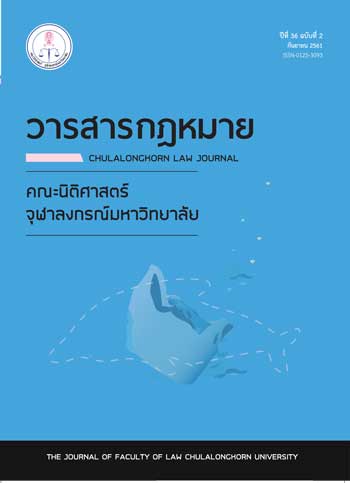การพัฒนากฎหมายคุ้มครองผู้รับงานไปทำที่บ้าน
Main Article Content
บทคัดย่อ
การวิจัย เรื่อง การพัฒนากฎหมายคุ้มครองผู้รับงานไปทำที่บ้าน มีวัตถุประสงค์เพื่อ 1.วิเคราะห์กฎหมายคุ้มครองผู้รับงานไปทำที่บ้านของไทย 2. วิเคราะห์และเปรียบเทียบอนุสัญญาและข้อแนะเกี่ยวกับการคุ้มครองผู้รับงานไปทำที่บ้านขององค์การแรงงานระหว่างประเทศกับกฎหมายไทยและกฎหมายต่างประเทศ 3. นำผลการวิเคราะห์มาสังเคราะห์เป็นข้อเสนอแนะในการพัฒนาพระราชบัญญัติคุ้มครองผู้รับงานไปทำที่บ้าน พ.ศ. 2553 ให้เหมาะสมต่อไป การวิจัยนี้เป็นการวิจัยเชิงคุณภาพ โดยการ 1. วิจัยเอกสารด้วยการศึกษาค้นคว้าและรวบรวมข้อมูลจากเอกสารต่างๆ รวมทั้งข้อมูลทางสื่ออิเล็กทรอนิกส์ ทั้งภาษาไทยและภาษาอังกฤษ 2. สัมภาษณ์เชิงลึกหน่วยงานที่รับผิดชอบ ผู้จ้างงาน และผู้รับงานไปทำที่บ้าน 3. สัมมนากลุ่มย่อยเพื่อรับฟังความคิดเห็นจากผู้เกี่ยวข้องโดยตรง
การศึกษาพบว่า 1. กฎหมายคุ้มครองผู้รับงานไปทำที่บ้านของไทยมีบทบัญญัติบางเรื่องที่ยังขาดรายละเอียดในการบังคับใช้ 2. บทบัญญัติของกฎหมายยังมีข้อบกพร่องบางประการ ทั้งในส่วนการคุ้มครองผู้รับงานไปทำที่บ้าน การให้ความเป็นธรรมแก่ผู้จ้างงาน และกระบวนการระงับข้อพิพาทระหว่างผู้รับงานไปทำที่บ้านกับผู้จ้างงาน 3. การบังคับใช้กฎหมายยังมีข้อขัดข้องทางปฏิบัติ และ 4. กฎหมายประกันสังคมยังมีข้อจำกัดทำให้ผู้รับงานไปทำที่บ้านบางคนไม่ได้รับสิทธิประโยชน์ที่เหมาะสม จึงมีข้อเสนอแนะดังนี้ 1. ควรเพิ่มบทบัญญัติในรายละเอียดที่ยังไม่สมบูรณ์ให้ครบถ้วนโดยการประกาศใช้กฎหมายลำดับรองตามที่กฎหมายบัญญัติให้อำนาจไว้ 2. ควรแก้ไขเพิ่มเติมบทบัญญัติให้ครอบคลุมการคุ้มครองผู้รับงานไปทำที่บ้าน ให้ผู้จ้างงานได้รับความเป็นธรรมตามสมควร และเพิ่มกลไกในการระงับข้อพิพาทโดยผู้ไกล่เกลี่ยข้อพิพาทระดับท้องถิ่นรวมทั้งเพิ่มเขตอำนาจศาลแรงงานให้มีอำนาจพิจารณาพิพากษาคดีเกี่ยวด้วยสิทธิและหน้าที่ระหว่างผู้รับงานไปทำที่บ้านกับผู้จ้างงานได้ 3. เพื่อแก้ปัญหาการบังคับใช้กฎหมาย ควรบัญญัติให้อาสาสมัครแรงงาน (อสร.) มีบทบาทในการช่วยเหลือพนักงานตรวจแรงงานในบางเรื่องเพิ่มขึ้น และให้มีการวางระบบข้อมูลเกี่ยวกับการคุ้มครองผู้รับงานไปทำที่บ้านของทุกหน่วยงานในกระทรวงแรงงานให้เชื่อมต่อกัน 4. ขยายหลักเกณฑ์การเป็นผู้ประกันตนในฐานะผู้ประกอบอาชีพอิสระให้เหมาะสมยิ่งขึ้น
Article Details
ลิขสิทธิ์และเนื้อหาในเว็บไซต์ของวารสารกฎหมาย (รวมถึง โดยไม่จำกัดเฉพาะ เนื้อหา รหัสคอมพิวเตอร์ งานศิลป์ ภาพถ่าย รูปภาพ ดนตรีกรรม โสตทัศนวัสดุ) เป็นกรรมสิทธิ์ของวารสารกฎหมาย และผู้ได้รับการโอนสิทธิทุกราย
1. วารสารกฎหมาย ให้อนุญาตให้คุณใช้สิทธิอันไม่เฉพาะเจาะจงที่สามารถถูกถอนเมื่อใดก็ได้ โดยไม่มีค่าใช้จ่าย ในการ
- เยี่ยมชมเว็บไซต์และเอกสารในเว็บไซต์นี้ จากคอมพิวเตอร์หรือเครื่องมือสื่อสารผ่านเว็บบราวเซอร์
- คัดลอกและจัดเก็บเว็บไซต์และเอกสารในเว็บไซต์นี้บนลงคอมพิวเตอร์ของคุณผ่านระบบความจำ cache
- สั่งพิมพ์เอกสารจากเว็บไซต์นี้สำหรับการใช้ส่วนตัวของคุณ
- ผลงานที่ได้รับการตีพิมพ์โดยวารสารกฎหมาย จุฬาลงกรณ์มหาวิทยาลัย ถูกคุ้มครองภายใต้ Creative Commons Attribution 4.0 International License ซึ่งอนุญาตให้ทุกคนสามารถคัดลอก แจกจ่าย ดัดแปลง ส่งต่อ ผลงานได้ ก็ต่อเมื่อผลงานและแหล่งข้อมูลได้รับการอ้างอิงอย่างเหมาะสม
2. วารสารกฎหมาย จุฬาลงกรณ์มหาวิทยาลัย สงวนสิทธิ์ไม่อนุญาตให้คุณใช้สิทธิอื่นใดที่เกี่ยวข้องกับเว็บไซต์และเอกสารบนเว็บไซต์นี้ เช่น การคัดลอก ดัดแปลง เปลี่ยนแปลง ส่งต่อ ตีพิมพ์ แจกจ่าย เผยแพร่ จัดแสดงในที่สาธารณะ ไม่ว่าจะในรูปแบบใดก็ตาม ซึ่งเว็บไซต์หรือเอกสารบนเว็บไซต์ โดยไม่อ้างอิงถึงแหล่งข้อมูลหรือโดยไม่ได้รับอนุญาตเป็นลายลักษณ์อักษรจากวารสารกฎหมาย จุฬาลงกรณ์มหาวิทยาลัย
3. คุณอาจขออนุญาตที่จะใช้เอกสารอันมีลิขสิทธิ์บนเว็บไซต์นี้โดยการเขียนอีเมลล์มายัง journal@law.chula.ac.th
4. วารสารกฎหมาย จุฬาลงกรณ์มหาวิทยาลัย เข้มงวดกับการคุ้มครองลิขสิทธิ์อย่างมาก หากวารสารกฎหมาย จุฬาลงกรณ์มหาวิทยาลัยพบว่าคุณได้ใช้เอกสารอันมีลิขสิทธิ์บนเว็บไซต์นี้โดยไม่ถูกต้องตามการอนุญาตให้ใช้สิทธิ ดังที่กล่าวไปข้างต้น วารสารกฎหมาย จุฬาลงกรณ์มหาวิทยาลัยอาจดำเนินคดีตามกฎหมายต่อคุณได้ เพื่อเรียกร้องค่าเสียหายที่เป็นตัวเงินและคำขอชั่วคราวให้คุณหยุดการใช้เอกสารดังกล่าว ทั้งนี้ คุณอาจถูกสั่งให้ชดใช้ค่าใช้จ่ายใดๆ ที่เกี่ยวข้องกับการดำเนินการตามกฎหมายนี้
หากคุณพบเห็นการใช้เอกสารอันมีลิขสิทธิ์ของวารสารกฎหมาย จุฬาลงกรณ์มหาวิทยาลัย ที่ขัดหรืออาจขัดต่อการอนุญาตให้ใช้สิทธิดังที่ได้กล่าวไปข้างต้น โดยเชื่อว่าได้ละเมิดลิขสิทธิ์ของคุณหรือของผู้อื่น สามารถร้องเรียนมาได้ที่ journal@law.chula.ac.th


